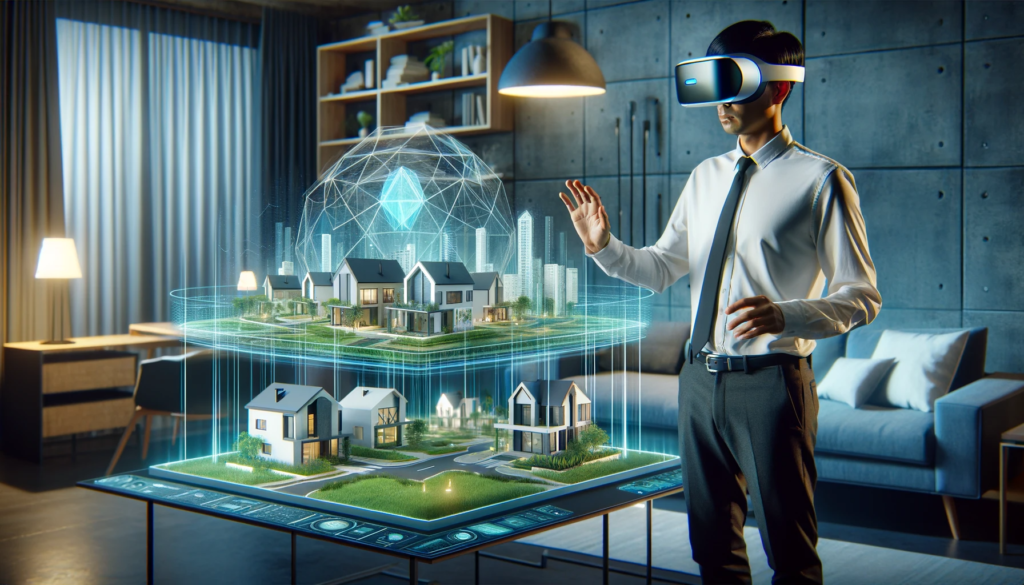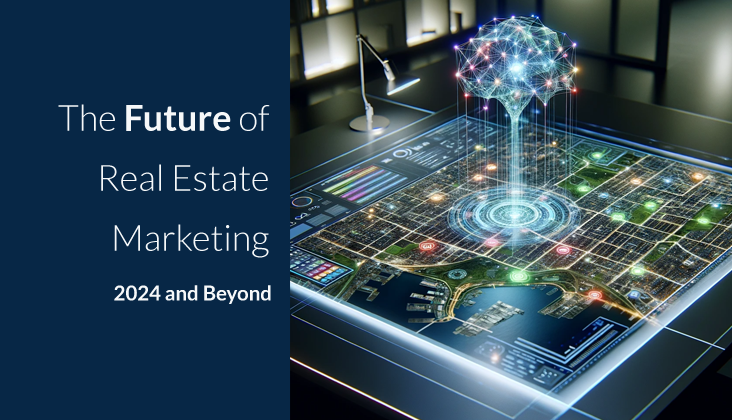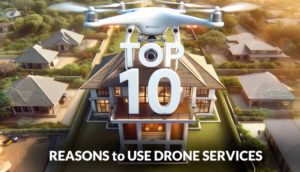Table of Contents
Introduction to The Future of Real Estate Marketing
As we look to the horizon of 2024 and beyond, the real estate landscape is poised for a transformation fueled by technological innovation and digital advancements. In the real estate industry, where change is the only constant, staying ahead means not just keeping pace with the present but anticipating the future. This article aims to demystify the upcoming trends and provide a strategic roadmap for real estate professionals looking to stay ahead in their field. Join us as we explore ten groundbreaking developments that will redefine the way we market, sell, and experience real estate in 2024 and the years to come.
I – Virtual Reality (VR) and Augmented Reality (AR) Immersive Experiences

As the dawn of 2024 approaches, we might witness a significant shift in how real estate is marketed, thanks to emerging technologies like Virtual Reality (VR) and Augmented Reality (AR). With devices like the Apple Vision Pro and other such devices becoming more accessible and affordable, these tools could soon be within reach of the average consumer, not just tech enthusiasts.
Understanding VR and AR: Virtual Reality (VR) immerses users in a fully digital environment, while Augmented Reality (AR) overlays digital information onto the real world. In real estate, VR could allow buyers to tour homes virtually, experiencing the space as if they were physically present. AR could enable them to visualize potential home improvements directly within the existing physical space.
The Impact of Accessibility: As VR and AR headsets become more affordable and widely available, we can speculate that their integration into real estate marketing may become more prevalent. This could democratize virtual property experiences, making them a new norm in showcasing homes.
Potential Market Evolution: Real estate professionals might need to adapt their marketing strategies if these technologies become commonplace. They could leverage VR to offer immersive tours and use AR to help clients envision custom renovations, potentially revolutionizing the home-buying experience.
A Future of Digital Open Houses?: The traditional open house could evolve, with digital showcases offering a virtual yet interactive exploration of properties, accessible to a global audience.
While the certainty of VR and AR dominating the real estate marketing sphere by 2024 is yet to be seen, the trajectory of technology suggests a promising integration, potentially offering a new paradigm for how we experience and invest in real estate.
II – Artificial Intelligence (AI) for Predictive Analytics and Personalization

The term ‘Artificial Intelligence’ has long held the promise of innovation, and 2023 was a pivotal year where this promise materialized in the real estate sector. Looking ahead, AI’s maturation is poised to usher in significant advancements in predictive analytics, personalization, and valuation. These developments will play a pivotal role in refining the strategic approaches employed by real estate professionals, providing them with cutting-edge tools to navigate the evolving landscape of the industry. AI’s tangible impact is set to redefine how real estate operates, promising efficiency, insights, and enhanced customer experiences.
Harnessing Predictive Analytics: The evolved AI of the near future might sift through the digital footprints of neighborhood growth — for instance, detecting patterns from local online job postings and correlating them with housing demands, enabling marketers to anticipate where the next wave of homebuyers may emerge.
Personalization at Scale: The concept of personalization will likely reach new sophistication, with AI curating property listings that reflect individual user preferences with uncanny accuracy. A user’s digital interaction, from the type of articles they read to the properties they linger on, could inform an AI-driven marketing suite that tailors content in real-time — ensuring every touchpoint is resonant with the potential buyer’s aspirations.
AI and Valuation Models: As AI integrates deeper into market analytics, it could offer valuation models that not only look at the present but also forecast future market trajectories. For example, the integration of localized economic development projects could allow for predictive pricing that helps sellers maximize their returns and buyers make informed investment decisions.
The strides made in AI as of 2023 are just the prelude to a future where real estate marketing may become more efficient, insightful, and individualized than ever before.
III – Blockchain for Transparency and Efficiency

As we anticipate the trends of 2024, the potential impact of blockchain technology on the real estate sector looms large. Building upon its impressive growth in recent years, blockchain stands as a transformative force in real estate. At its core, blockchain represents a system that harnesses the collective power of interconnected computers to uphold a singular, secure, and immutable ledger of transactions. This innovative architecture renders any data recorded on the blockchain virtually impervious to tampering, creating an unassailable trail of trustworthiness and transparency that could reshape the foundations of the real estate industry.
Demystifying Title Management: In real estate, managing property titles can be complex and paperwork heavy. Blockchain could streamline this by securely recording titles on its network, ensuring that they are easily verifiable and protected against unauthorized changes, making the process faster and more reliable.
Smart Contracts Streamlining Transactions: Smart contracts are self-executing contracts with the terms of the agreement directly written into lines of code. In real estate, this could mean that once certain conditions are met—like the receipt of a payment—the transfer of property ownership could occur automatically, with all the necessary updates to titles and records happening in the background, securely and efficiently.
Cultivating Trust Through Transparency: With blockchain, every transaction is recorded in a way that it’s open for confirmation and public verification, which could significantly reduce instances of fraud and disputes over property history.
While blockchain’s definitive role in the future of real estate marketing is not yet fully realized, its potential for making transactions more secure, transparent, and efficient suggests that it may well become an integral part of the industry.
IV – Sustainable and Smart Home Marketing

As we journey into the landscape of 2024, the growing fascination with sustainable living and the integration of smart technology is poised to emerge as a defining theme in real estate marketing. This profound shift is propelled by a discernible change in consumer preferences, with a rising demand for homes that not only reduce their environmental footprint but also embrace cutting-edge technological innovations to elevate the overall quality of living. This convergence of sustainability and smart technology represents a powerful force that real estate professionals must reckon with, reshaping the narrative of the industry and the very essence of what constitutes an ideal home.
Promoting Eco-friendly Living: Features like solar panels, EV chargers, and energy-efficient appliances are increasingly becoming benchmarks for modern, eco-conscious homes. Marketing these homes will likely focus on the blend of sustainability and innovation, emphasizing the ease of charging electric vehicles at home, which is rapidly becoming a priority for environmentally minded consumers.
Highlighting Smart Home Technology: The integration of smart home systems—ranging from advanced thermostats to comprehensive security solutions—is expected to be a key selling point. Real estate marketing might highlight how these technologies deliver not just convenience and efficiency but also adaptability to future innovations.
Underlining Energy Efficiency: With energy costs on the rise, the demand for energy-efficient homes, complemented by smart technology and EV charging capabilities, is anticipated to grow. Real estate marketing strategies could pivot to spotlighting the cost savings and environmental benefits of these features, positioning them as smart, future-proof investments.
The push for homes that are both environmentally responsible and technologically adept is likely to shape real estate marketing strategies, as these features respond to the evolving desires of the modern homeowner.
V – The Integration of Big Data in Real Estate Decision-Making

As we build on the foundations set by AI in Section 2, the role of big data in real estate is poised to expand significantly. The synergy between AI and big data could lead to unprecedented precision in understanding market dynamics and consumer behavior.
Refining Market Strategies with AI and Big Data: AI’s advanced algorithms can process the vast amounts of data generated within the real estate market, uncovering trends and buyer preferences, which allows for agile and informed marketing strategies.
Tailoring Experiences with Precision: AI’s analytical power, combined with big data insights, can tailor property recommendations and marketing campaigns to the unique patterns and needs of individual clients, enhancing their journey from browsing to buying.
Data-Driven Risk and Investment Analysis: Big data, when analyzed through sophisticated AI models, can sharpen the accuracy of risk assessment and investment viability, leading to smarter, more profitable decisions in the real estate market.
The convergence of AI and big data is not just a technological evolution; it’s set to be a transformative force in real estate marketing, offering a richer, more nuanced understanding of the market as we approach 2024.
VI – The Rise of PropTech and Its Impact on Real Estate

The term ‘PropTech,’ short for Property Technology, encapsulates a wave of technological innovations meticulously engineered to refine, revolutionize, and reimagine the multifaceted landscape of the real estate industry. As we cast our gaze forward to 2024, it’s conceivable that PropTech will outgrow its status as a mere buzzword, seamlessly integrating itself as an indispensable component of everyday real estate operations. This transformation holds the potential to reshape not just property management and transactions but the entire real estate ecosystem, fostering efficiency, transparency, and adaptability like never before. PropTech’s evolution could be the catalyst for a new era in real estate.
Streamlining Operations: PropTech can automate and optimize property management tasks, from rent collection to maintenance requests, potentially offering a smoother, more efficient experience for both landlords and tenants.
Enhancing Property Transactions: Digital platforms could make buying, selling, and leasing properties faster and less cumbersome, with technologies like blockchain underpinning secure, transparent transactions.
Transforming Real Estate Services: With real estate virtual tours, AI-driven market analysis, and online transaction capabilities, PropTech may offer a suite of services that make the traditional real estate agency model more digital, flexible, and client-focused.
As PropTech continues to evolve, its influence on the real estate market is expected to grow, potentially becoming a critical element in the marketing and management of real estate by 2024.
VII – The Evolution of Hyper-Local Marketing in Social Media

Hyper-local marketing on social media is on the cusp of a remarkable transformation set to unfold by 2024. While today’s platforms do provide some localized targeting capabilities, the horizon reveals a landscape of even greater precision. This upcoming era promises real estate marketers the ability to connect with potential clients on an incredibly granular neighborhood level. It’s a future where campaigns resonate with specificity, forging deeper connections and relevance within communities, ultimately redefining how real estate is marketed and experienced through digital channels.
Advanced Localized Targeting: As social media platforms enhance their targeting algorithms, real estate professionals will be able to craft campaigns that speak directly to the heart of individual communities, even down to specific streets or buildings.
Deep Community Integration: Future social media marketing might involve strategies that go beyond advertising, fostering deep community ties. Realtors could participate in local groups and discussions, positioning themselves as integral parts of the neighborhoods they serve.
Hyper-Relevant Content Delivery: With further advancements, social media could allow for the dissemination of content tailored not just to general interests, but also to the hyper-specific needs and cultural nuances of distinct locales.
The trajectory we’re on suggests that by 2024, hyper-local marketing on social media will become an even more potent tool for real estate professionals, offering unprecedented opportunities to engage with buyers and sellers at a deeply local level.
VIII – The Advancement of 5G and Its Potential in Real Estate Marketing

While the rollout of 5G is currently in its nascent stages, marked by varying degrees of implementation among different service providers and regions, the trajectory of this technology suggests a more mature and widespread 5G network by 2024. This evolution is poised to revolutionize real estate marketing tools, elevating interactivity and responsiveness to unprecedented levels. The anticipated growth of 5G promises not only faster connections but also the potential for more immersive virtual experiences, streamlined transactions, and real-time data access, reshaping the way we engage with the real estate market.
Redefining Virtual Property Showcases: The advent of robust 5G networks will likely make high-definition virtual property tours more fluid and responsive, offering a near-instantaneous loading of immersive visual content for prospective buyers.
Speeding Up Real Estate Transactions: With its promise of greater bandwidth and lower latency, 5G could accelerate online real estate transactions, enabling quick and reliable exchanges of documents and communications.
Real-time Data at the Agents’ Fingertips: The ability of 5G to handle massive data streams in real-time may empower realtors with instant access to property listings, market data, and client feedback, facilitating on-the-go decision-making and responsiveness.
As 5G continues to evolve and expand, its full potential in real estate marketing remains to be tapped, but the direction is clear: faster connections could lead to more dynamic and efficient marketing strategies.
IX – The Growth of Content Marketing and Storytelling

As the marketing landscape evolves and the real estate industry adapts to changing consumer expectations, the strategies and tactics employed in content marketing are on the brink of a profound transformation. By 2024, we can anticipate a real estate marketing landscape where content marketing is not just a tool but a dynamic and highly sophisticated approach. This evolution will not only enhance the reach and resonance of real estate marketing but also empower professionals to create impactful narratives that resonate deeply with buyers and sellers, ultimately redefining how properties are showcased and transactions are facilitated.
Authentic Storytelling: Real estate professionals may increasingly use storytelling to create an emotional connection with properties. By sharing the history of a home, the story of the neighborhood, or the potential future a buyer could have there, agents can engage clients’ imaginations and emotions, making the property more memorable and appealing.
Content Diversification: The real estate market is likely to expand its reach across various content forms, from immersive 360-degree video tours to informative podcasts discussing market trends. This multi-channel approach can cater to diverse buyer preferences, ensuring that property listings capture attention across different audience segments.
Educational Content: Providing buyers with comprehensive guides, market analysis, and tips for homeownership can help real estate marketers build trust and establish themselves as subject matter experts. This educational content can empower buyers to make informed decisions, fostering a relationship that goes beyond the transaction.
By embracing these content marketing strategies, real estate professionals could greatly enhance their engagement with potential buyers, creating a narrative that sells not just a property, but a dream.
X – The Personal Touch in Digital Communication

As we cast our sights toward the ever-evolving landscape of real estate marketing in 2024 and beyond, the significance of personalization in digital communication is poised to ascend to new heights. In a vast sea of digital interactions, real estate professionals who master the delicate art of personal touch and customization are expected not only to stand out but to forge enduring, robust relationships with their clients. This heightened focus on personalized digital communication transcends conventional marketing; it becomes a conduit for trust, and genuine connections that resonate deeply with clients in the ever-evolving digital real estate realm.
Customized Client Interactions: Utilizing data and AI, real estate professionals might offer personalized communication that feels as thoughtful and individualized as a handwritten note, even when it’s delivered through digital channels.
Responsive Communication Technologies: The development of chatbots and AI-driven communication tools could evolve to provide near-human levels of interaction, being able to understand and respond to complex queries in real-time.
Building Relationships Beyond the Screen: By leveraging video calls, personalized virtual tours, and other interactive digital tools, realtors could create a sense of personal connection and trust, vital in the decision-making process of buying or selling a home.
The digital realm offers vast opportunities for personalization, and those who harness it effectively could add a memorable and distinctive element to their service, even as digital interactions become the norm.
Conclusion: The Future of Real Estate Marketing, 2024 and Beyond
As we cast our gaze towards the horizon of 2024 and beyond, the potential for innovation within real estate marketing is both vast and varied. While we anticipate that some technologies and strategies discussed may take root rapidly, others may unfold more gradually or diverge in unexpected ways. This list is not exhaustive, but it represents the trends we believe have the strongest potential to make a significant impact in the near term. The future is often unpredictable, but by preparing for these developments now, real estate professionals can position themselves at the forefront of a dynamic, evolving industry.





